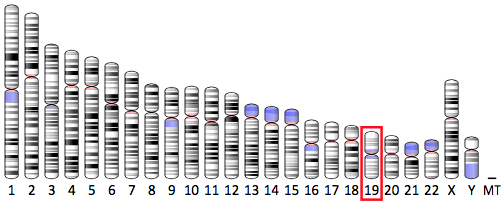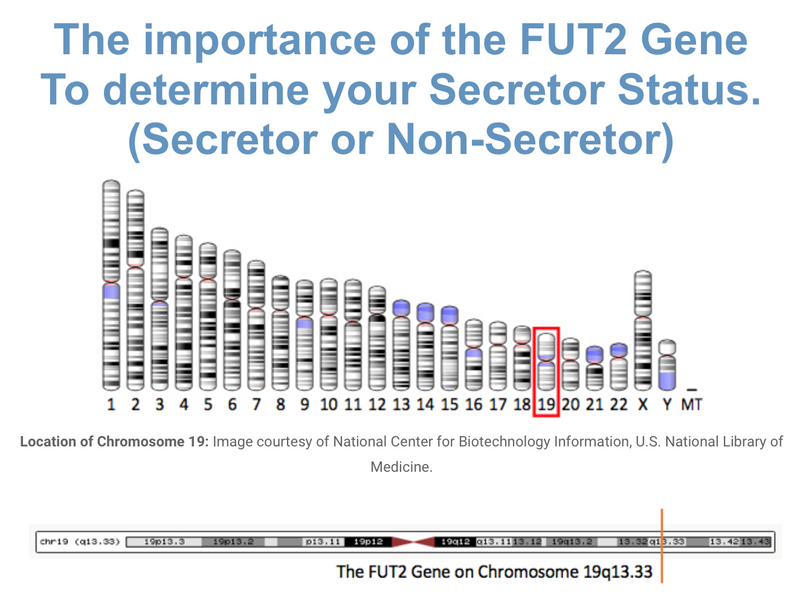Dr. Peter D'Adamo ND MIfHI first introduced the world to the concept of Secretor Status in his book Live Right For your Type. If you are an exponent of the Blood Type Diet®, you will by now probably be familiar with the concept that your ABO blood type is controlled by genetics. The ABO gene coding for your blood type lies on chromosome 9 at the band 9q34.2. However, a separate gene, FUT2, which lies on chromosome 19 at the band 19q13.33, actually interacts with your ABO blood type gene, and determines your ability to secrete your blood type antigens into body fluids and tissues.

Location of Chromosome 19: Image courtesy of National Center for Biotechnology Information, U.S. National Library of Medicine.

In the genetics of the secretor system two options exist. A person can be either a Secretor or a Non-secretor. This is completely independent of whether you are a blood type A, B, AB, or O. This means that someone can be a Type A Secretor or an Type A Non-secretor, a Type B Secretor or a Type B Non-secretor etc.
- A Secretor is defined as a person who secretes their blood type antigens into body fluids and secretions like the saliva in your mouth, the mucus in your digestive tract and respiratory cavities, etc. Basically what this means is that a secretor puts their blood type into these body fluids or, you can determine your blood type from any of these fluids. As a general rule, about 80% of the population are Secretors.
- A Non-secretor on the other hand puts little to none of their blood type into these same fluids. Basically what this means is that you can only determine a Non-secretor's blood type from a sample of his or her blood. As a general rule, about 20% of the population are Non-secretors.
Advantages and Disadvantages
With respect to the ABO blood types, it is very difficult to state that one type is more advantageous than another. Each blood type has its own strengths and characteristic weaknesses. However, this does not appear to be the case with the Secretor gene. As a generality, being a Non-secretor (based on all of the available information currently available) does actually appear to be a potential health disadvantage. At a very basic level, being able to secrete blood type into your saliva, mucus, etc. allows for an added degree of protection against the environment, particularly with respect to microorganisms and
lectins.
An additional advantage of being a Secretor might be a generalized tendency to promote a stabilized, blood-type friendly intestinal bacterial ecosystem. Many of the friendly (probiotic) bacteria in your digestive system actually use your blood type as one of their preferential foods. Since Secretors have a steady supply of blood type in the mucus that lines the digestive tract; their bacteria have a much more constant food supply.
Metabolic Differences Between Secretors and Non-Secretors
Similar to the ABO blood types, it appears additional genetic information must be linked to the
Secretor gene, because predictable trends in non-blood type aspects of physiology have a close association with Secretor/Non-secretor status. Aspects of physiology such as the relative activity of an enzyme called intestinal alkaline phosphatase; propensities toward clotting, reliability of some tumor markers, and generalised performance of your immune system have predictable trends depending upon your Secretor status.
The activity of intestinal and serum alkaline phosphatase is strongly correlated with
secretor phenotypes. Basically, Non-secretors, independent of their ABO blood groups (blood type O's have the highest alkaline phosphatase activity and blood type A's the least), have lower alkaline phosphatase activity. It has been estimated that the serum alkaline phosphatase activity of Non-secretors is only about 20% of the active in the Secretor groups.
As was mentioned in Dr D'Adamo's first book,
Eat Right 4 Your Type, blood type impacts the clotting ability to a significant degree. In fact, it has been estimated that a significant fraction (30%) of the genetically determined variance in plasma concentration of the von Willebrand factor (vWf) clotting factor is directly related to ABO blood type. As a rule, it is blood group O individuals who have the lowest amount of this clotting factor.
Secretors have the slowest clotting while Non-secretors have shorter bleeding times and a tendency towards higher levels of the clotting factor VIII and vWf. ABO and Secretor genetics actually further interact to influence blood viscosity. In essence what this means is that an Blood Type A Non-secretor will be at the far end of the spectrum with the slowest bleeding times, thickest blood viscosity, and the most probability to have high platelet aggregation. On the other end on the continuum will be Blood Type O Secretors, who will have the longest bleeding time, thinnest blood, and least tendency for platelet aggregation. Because of this, Non-secretors (especially the type A's) tend to be at the highest risk for future atherothrombotic and heart disease.
Disease Susceptibility among Secretors and Non-secretors
Digestive System
As a general rule, a higher intensity of oral disease is found among
Non-secretors. This includes dysplasia (precancerous changes to the tissue) and an increase in cavities. Statistically speaking, Blood Type A Secretors have the lowest number of cavities.
Non-secretors also tend to have more digestive problems. Several studies have indicated that Non-secretors have a significantly higher rate of duodenal and peptic ulcers. Non-secretors are also less resistant to infection by Helicobacter pylori (a microbe associated with ulcers). It appears that this organism can colonise more readily and generate more inflammation in individual's incapable of secreting their blood type into the digestive tract.
Non-secretors are at an increased risk for development of celiac disease (up to 48% of patients with celiac disease have been reported to be Non-secretors).
Respiratory System
With regards to aspects of lung function, being a
Non-secretor takes its usual place as a health disadvantage. Several researchers have suggested that being a Non-secretor might predispose an individual to damaging effects, while being a secretor might add a degree of protection against harmful environmental assaults to our lungs.
Among coal miners, asthma was significantly related to
Non-secretor phenotype. Secretors also appear to receive a degree of protection against some of the deleterious effects of cigarette smoking. Evidence suggests that the ability to secrete ABO blood type antigens might decrease the risk of Chronic Obstructive Pulmonary Disease (COPD).
Being a
Non-secretor also offers a slight increase risk for having a problem with habitual snoring.
Autoimmune Disease
Non-secretors appear to have an increase in the prevalence of a variety of autoimmune diseases including ankylosing spondylitis, reactive arthritis, psoriatic arthropathy, Sjogren's syndrome, multiple schlerosis, and Grave's disease.
Diabetes, Heart Disease, & Metabolic Syndrome X
Non-secretors are at a greater risk of developing diabetes (especially adult onset diabetes); and they might be at a greater risk of developing complications from diabetes. Data allows the conclusion that Non-secretors are a risk factor for myocardial infarction and heart disease (note: this is particularly true for men).
Several different researchers have noted a connection between a metabolic syndrome called "Syndrome X" and
Non-secretor blood types. Syndrome X is a clustering of metabolic problems comprised of insulin resistance (your cells do not respond effectively to the insulin that you create), elevated plasma glucose (high blood sugar), lipid regulation problems (elevated triglycerides, increased small low-density lipoproteins, and decreased high-density lipoproteins), high blood pressure, a prothrombic state (tendency to clotting), and obesity (especially central obesity or a predisposition to gaining weight in the abdomen). This cluster of metabolic disorders seem to interact to promote the development of diabetes (adult onset type II), atherosclerosis, and cardiovascular disease. While insulin resistance might lie at the heart of the problem, all of these metabolic disorders appear to contribute to health problems.
Alcoholism
Alcoholism has been associated with the
Non-secretor blood type. On the positive side, alcohol consumption appears to exert a protective effect on lung function and to lower the risk of heart disease more in Non-secretors than in Secretors. The key principle with the use of alcohol is for Non-secretors (and everybody actually) is moderation.
Bacteria Urinary Tract Infections
Non-secretors are at a greater risk for recurrent UTI's, have a greater tendency to increased inflammation, and are much more likely to develop renal scars. Being Secretor on the other hand offers a degree of protection; cutting your risk of recurrent UTI's by greater than 50% and dramatically decreasing the likelihood you will have renal scars develop.
Candida infection
Based upon this tendency of Non-secretor saliva to not only fail to prevent attachment of Candida, but maybe actually promote the binding of Candida to your tissue, we would expect that research would show higher tendency to Candida problems among Non-secretors. This is what we find to be true. Non-secretors are much more likely to be carriers of Candida and to have problems with persistent infections. Blood Type O Non-secretors might be the most affected of the Non-secretor blood types, since Candida also appears to have an easier time colonising (attaching to) the blood type O antigen.
Antibody levels
Secretors are known to have higher levels of IgG and IgA antibodies. The lack of IgA antibodies perhaps explains the link between Non-secretor status and an increased frequency of heart valve problems secondary to bacteria infection. Because IgA functions much like the way a rampart or palisade wall protects a town from invasion, most if not all Non-secretors have problems with gut permiability ("leaky gut").
Determining Your Secretor Status at Body and Mind Studio® International
Hopefully you can begin to appreciate that having information about your Secretor/Non-secretor status might be a valuable piece of health information. While, unfortunately, the news for Non-secretors is not as positive as it is for Secretors, it is better to have the information. With information comes knowledge, and with knowledge, comes the ability to intervene.
To determine your secretor status, we offer the D'Adamo Personalized Nutrition International Secretor Status Collection kit.
Saliva Secretor Status Collection Kit - International Edition (Non USA)

Our single-use test DNA Secretor Status Test Kit uses the latest in SNP genotyping to determine your FUT2 Secretor Status (Secretor, or Non-secretor). Simply swipe the cotton swab provided in the test kit along the inside of your cheek, insert the swab into our convenient packaging, attach the label, and send the specimen to the Genova Diagnostics laboratory >> Click here for more <<
Look for further information on Secretor/Non-secretor blood type connection in Dr D'Adamo's book Live Right 4 Your Type. In addition to allowing important diet refinements, knowing your secretor status can help you use nutritional supplements more effectively and intelligently while adding to your awareness of illness and metabolic dysfunction you may be prone to because of your secretor genetics.
Peter J. D'Adamo, ND, MIFHI
Peter D'Adamo is a distinguished professor of clinical sciences at the University of Bridgeport College of Naturopathic Medicine, USA, a naturopathic physician, author, researcher-educator, Ivesian, software developer and air-cooled enthusiast. He is a recognised authority in glycobiology, particularly the ABO blood groups and the secretor (FUT2) polymorphisms. He is versant in several computer languages, with SWAMI (serotyping with advanced modifiable inventories) and OPUS23 just two of his software applications currently in use.
Dr D'Adamo teaches Generative Medicine I and II, Introduction to Biochemical Individuality of Naturopathic Medicine, and supervises a specialised clinic shift in Personalised Medicine at the University of Bridgeport. He has published the first textbook in naturopathic systems biology, Fundamentals of Generative Medicine, Vol. 1 (Drum Hill Publishing, LLC).
He is the author of several popular books, all of which can be found by clicking here including the New York Times bestseller, Eat Right for Your Type (Penguin Putman) and most recently Change Your Genetic Destiny (Random House).
Paul Hopfensperger, MIFHI, MCMA
Paul Hopfensperger is a UK based Master Instructor for Dr. Peter J D'Adamo's Institute for Human Individuality at Body and Mind Studio®. He specialises in The Blood Type Diet®, The GenoType Diet® and OPUS23 Genomic Bioinformatics. He was the first and only person from the UK to attend the inaugural OPUS23 Genomic Bioinformatics training seminar conducted by Dr D'Adamo at the Center of Excellence in Generative Medicine, University of Bridgeport College of Naturopathic Medicine, USA in April 2016. Paul also holds a diploma in Diet and Nutrition, and a post graduate diploma in Chinese Nutritional Therapy from The College of Naturopathic Medicine in London. He is a Member of the Complimentary Medical Association.







